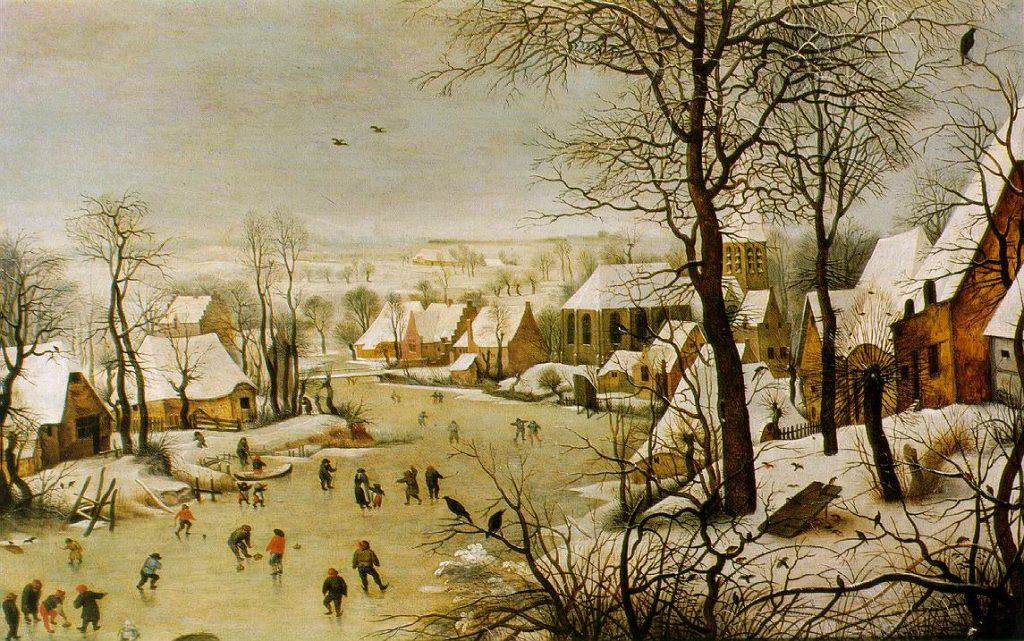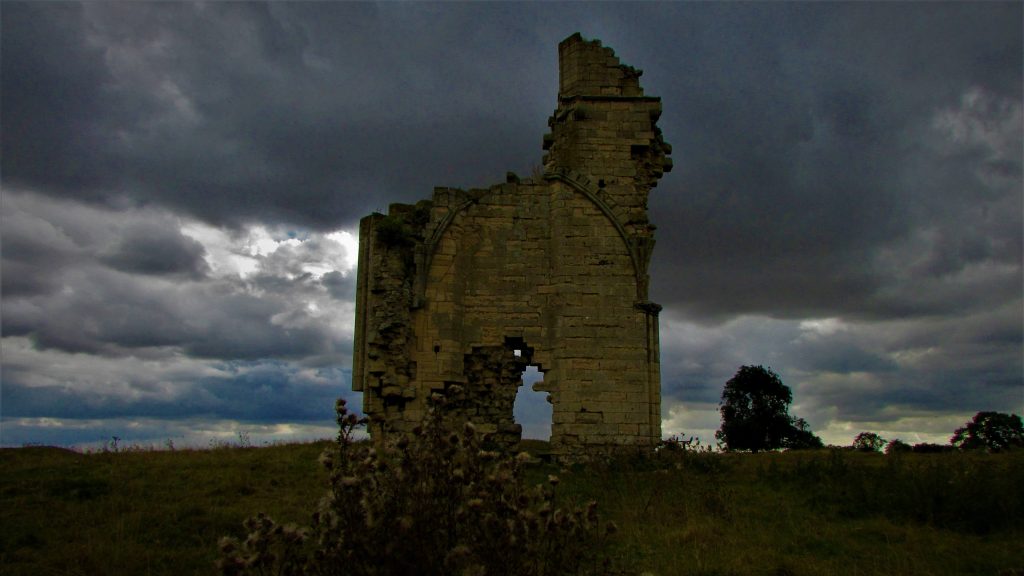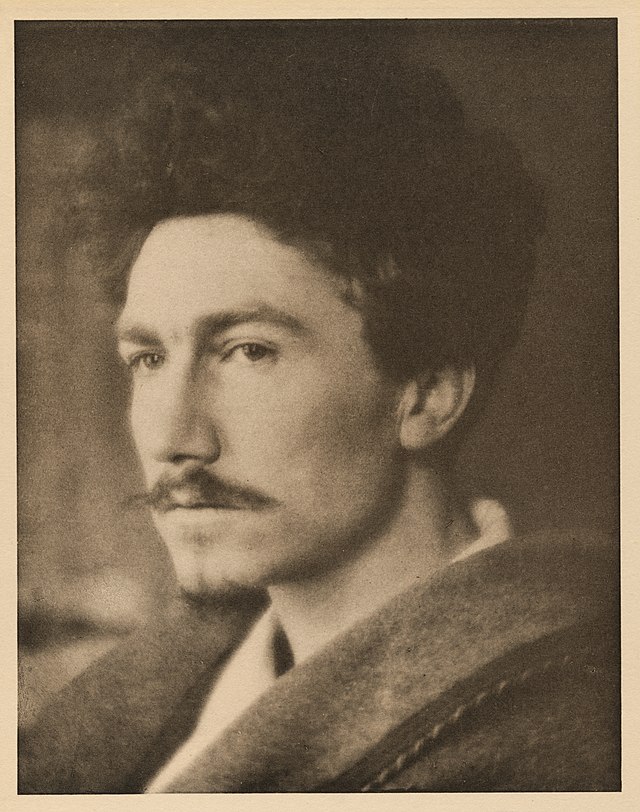LIAM GUILAR continues his epic of early Britain
The story so far. In the 5th century Vortigern’s attempt to hold the imperial province of Britannia together has been defeated, not by external enemies but by British rebels led by Vortimer, his eldest son. Vortimer is a devout Christian and has invited the Pope to send an embassy to restore the church and combat the Pelagian heresy. What follows is the first half of Chapter ten which loosely follows the fifth Century Life of Saint Germanus . You can find chapters 2-9 on the Brazen Head. The complete story has been published as A Man of Heart, by Shearsman UK (January 2023), available here
At the court of Vortimer the King
Above, bare wooden beams.
The hall is badly lit, too many
shadows confuse the walls.
The candle complicates the page.
There’s a broken wreckage of a man
beyond the table, out of sight,
but he knows he’s on his knees,
the shadows can’t disguise
how uncontrolled his sobbing has become.
Two armoured men are looking carefully
at the wall behind him.
‘For your skill with words,’
said his superior,
‘you will join the Papal mission.
You will travel to Britain.
You will record everything.’
Only now he understands
it was curse not compliment.
Here words slither and slop,
like the entrails of a corpse
he has to carry to its grave.
‘Who saw the King today?’
the officer enquires.
The scribe indicates he cannot hear the man’s reply.
The guards move, the man sobs.
‘The pagan woman, the Earl of Gloucester,
slaves, attendant lords…
hand poised, aware the sentence is unfinished.
The officer leans forward. ‘Who else?’
Like a secret heard by accident,
so soft, if a voice could hide, his does:
‘Your masters.’
The two armed men stare at the wall
The scribe puts down his stylus.
They have questioned slaves
who revealed nothing before they died.
There are several court officials
who saw the King in their daily duties
but each swears he saw nothing
and no one saw him without others present.
There were still many wished to see him.
Not like that.
Remembering the last time he saw Vortimer,
writhing, frothing at the mouth,
fouling himself, screaming.
Lupus of Troies enters. ‘The King is dead.’
He indicates the scribe should write the news.
The guards remove the witness,
as Germanus of Auxerre re-enters;
Bishop, on an embassy to combat heresy,
ex-governor, ex-general, proto-saint.[i]
The scribe has travelled with these two,
has become alert to the way they rarely say
that water’s wet. Their silence has
so many meanings but they navigate
the alternatives and rarely get them wrong.
He is aware the words he writes dress
one version of the truth and send it
marching off towards the future
while other possible interpretations
loiter round the edges of the page
like unwanted slaves at an auction.
Germanus:
‘Every Lord who heard his welcome speech
has to be a suspect.’
‘It was poison.’
‘Domestic or foreign?’
‘Impossible to tell unless the vial is found.’
‘And that’s impossible?’
The drama of silence. How can there be meaning
without interpretation in what’s unsaid?
The words he writes across the parchment
have no spaces, but here so much happens in the gaps.
Face blank, he moves the words across the page
and later, perhaps tonight, perhaps at the ugly hour,
staring into nothing, curled into himself
a long way from his home,
imagining all the ways a boy can die,
he will wonder if he hasn’t just recorded a confession
and signed his name to his own death warrant.
He knows what wasn’t written down.
Germanus rests his hand,
so very gently on his shoulder.
If he touched the hand, the ink might blot,
might suggest to an observant scrutineer,
‘Here something happened.’
‘We came to root out heresy.’
They have been arguing.
Germanus is troubled by the inquest.
‘Pope Siricius debarred from holy orders
all who after baptism held administrative posts
or served in the army, the civil service,
or had ever practised as barristers.’
Lupus searches for the appropriate quotation.
He knows this man is closer to his Christ
than anyone he’ll ever meet.
But his literal reading of the gospels
is a cliff on which every ship must wreck.
His Christ never ruled a kingdom;
or had to deal with heretics and raiders;
or arbitrate between contenders for a throne.
He finds the appropriate quote
in his well-trained lawyer’s memory:
‘These powers have been granted by God
and the sword has been permitted
for the punishment of the guilty-
those who wielded it were not blameworthy.’[ii]
‘My Christ,’ says Germanus, quietly,
‘came to save the poor and wretched.
He bought a message of hope and charity.
How can I love my neighbour
and send him to be tortured?
What kind of lover sends their friends
to the executioner?’
‘A disappointed, saddened one?’
The ruthless governor, the iron fisted general,
the lawyer who could kill with words,
flashes to reanimate the bag of bones
and Lupus, despite himself, steps back.
‘Faith does not deal in dialectics.’
The scribe watches, wonders why this,
why now, and why this pause?
He watches Lupus, waiting, saying nothing,
until Germanus shrugs and they both smile.
He can hear the wooden walls
settle. He can hear the fire.
He can hear, outside, voices
and lamentations. Someone repeating:
‘The King is dead. Vortimer the King is dead.’
A gesture indicates the scribe should write again.
‘Where is the woman?’
‘Fled from the court my lord.’
‘And Gloucester?’
if you listen, and ignore the shock,
it’s there, the faintest trace?
Amusement? In the voices.
‘Outside, trying not to pace.’
‘Better bring him in then.’
Somewhere in northern France, months earlier
A young man on his knees
in the cold austerity of his cell.
Rare visitors, three much older men:
one white haired, chicken necked,
dressed only in a tunic and a mantle
despite the time of year:
his holiness, Bishop Germanus of Auxerre.
The other tall, solid, well-fed:
Bishop Lupus of Troies.
‘They are sent by our Holy Father in Rome
to combat the Pelagian disease in Britain.
They need a scribe to record their victory.
You have been chosen,’ said his superior,
who seemed small beside the others,
‘for your skill with words,
your beautiful calligraphy.’
And the sin of pride was his.
Thinking, of course, I am the best
and it is just that I am recognised
after the years of being slighted
by the other scholars.
They will watch me leave.
They will see I have been chosen.
He had not been outside his community
since he entered as a child. He had not seen
beyond the familiar sky line,
the terrifying open space
stretching before, behind, above.
They plodded towards the coast.
It was the ash end of the winter,
cold lurked in the morning
and a wind that shrank skin against bone
blew over the flat dead fields.
Reports of bagaudae made them cautious.
Incongruous discrepancies:
‘An historic Papal mission to save Britannia’s soul’
sounded grand on parchment, but
two old men, a boy, some servants
and a bunch of bored and scruffy soldiers.
They had sheltered in a ruin,
the walls liquid stains
on a darkness with no boundaries,
full of furtive noises.
Shivering at the edge of light
scattered by their feeble fire,
he knelt for the comfort of prayer,
startled by a strange mewling sound
he recognised as his own voice.
The darkness split. Imploded.
A voice in his head screamed silence
and a vague stain appeared
suggestive of a man in chains.
Stones rose, began to pelt the travellers
who scuttled for shelter, except for Germanus.
‘What ails you? Why do you harm us?’
The stone storm falters into sounds of stones falling.
Germanus strides towards the ruin, passing the boy.
‘Follow child.’ He pauses at a pile of rubble,
speaks quietly, knowing the soldiers had come.
‘Bring light, dig here.’
Two rotted bodies, still in chains.
‘Thieves,’ said Lupus, ‘condemned men.
Dumped like the rubbish that they were.’
Germanus was offended.
‘Images of the Almighty, made in his likeness
should not be so mistreated. Find something
we can use for shrouds, bury them properly.
We will pray for their souls. ‘
The two bishops square off against each other.
One strong, virile, the other bent and old.
Neither speaks until Lupus smiles and bows.
Next morning the boy had stumbled over Germanus,
who was grinding barley for his breakfast,
dressed only in his hair shirt.
Lupus had servants to make him comfortable.
Germanus slept on the cold ground,
a faded military cloak for blanket.
But the old man was friendly,
keen to know the boy better.
‘My father left me with those monks
when I was barely five years old.
He would have sold me off to pay a debt
but couldn’t find a buyer in our village.’
Germanus sees,
bewildered, frightened and alone
a timid child in a hard bare cell.
‘God sees through you.
You were terrified of being wrong
so you learnt to be correct.
The library was home, the classroom
and the daily rituals offered certainty.
Applause substituting for affection.
Approval and your teacher’s admiration
as compensation for your peer’s contempt.’
Skewered, the boy looks away,
remembering the casual nastiness of boys
who had agreed he was the victim.
‘But you fell in love with words,’
continues Germanus.
‘The way they could be marshalled
to march away from ambiguity
and took a sour delight
watching boys who bullied you
being bullied by their teachers
because they were slow, and stupid
and didn’t know one case from another.
It’s alright child. You’ve done no wrong.
There is no grammar of divinity.
Language like the evening fire
only illuminates so much.
God exists beyond the pale glow
of human reasoning. Only fools
believe they understand his ways.
He had a plan for you and here you are.’
The boy looks beaten.
And because Germanus
can manage a robust kindness:
‘Do you have any questions?’
‘What is this Pelagius? Child, he was a British fool
who thought a man might find his way to Grace
without the help of God. Much that he said…
Much that he said was good.’ The old man’s
mottled hand moved the mortar slowly,
the rough barley crackling between the stones.
The disturbing bustle of their camp
distanced by the creased and speckled hands.
‘Pelagius said: A man must try to live a sinless life,
and if he fails, it is his own fault.’
‘But…’
‘Child, where is God in this? For Pelagius,
a man stands or falls alone. He doesn’t need
God or the Church. Nor can priest absolve the man
or give him penance. One sin damns you to hell.
Where is Christ’s charity in that?’
What manner of man is this, that even the wind and sea obey him?[iii]
First sight of the sea; a sullen border
between dark land and empty sky.
His shot nerves torn ragged.
The smell and noise and restlessness
of the wharves had no grammar, and then
the pointless rage of heaving waves
pushing and crashing and trying to erase their tiny ship.
He had clung to the rail and prayed
as the world lurched, rolled and staggered,
until, opening his eyes, he saw
right at the bow, Germanus
drenched in the rise and fall
like the saviour rising from death
shedding the green water,
hands raised, arms outstretched
and he will swear on the holiest of relics
on his chance of salvation
and on his faith in the risen Lord
that Germanus of Auxerre
ordered the sea to be calm.
And the sea obeyed him.
Arrival
They watched the riders coming down the beach
and he was frightened by the powerful grey horses;
teeth, hooves and sweating muscle,
and their armoured riders, more beastly than their mounts.
He knew their type; animals who could not reason,
or be reasoned with. A casual indifference to other’s pain.
He remembered men like this, riding through his village,
their arrogance, their twisted humour,
the ease in which they warped from indolence to rage.
Burnished armour, banners scraps of sudden colour on the breeze
and when the herald had established their identities
the riders moved aside to allow a young man on foot.
Dressed in gold brocaded silk; the kind of man, he thought,
who looks at home in silk. Not much older than himself,
but confident and eager. ‘Where is the King?’
asked Lupus, affronted by this lack of protocol.
‘I am Vortimer, ruler of this kingdom.
Vortigern is my father, a failed King his subjects drove away.
He brought in heathen people. They broke our laws,
defiled our women, corrupted our good customs.
We have destroyed their army, driven them to their ships.
In this new land we worship the true God.
With your help we will rebuild His church.
Every worthy man shall have his place,
and every serf and slave will be set free.
Church lands I will entrust to you.
Every widow will be exempt the tax
upon her husband’s legacy.
We will help you root out heresy
and crush all heathen practice.
Hengist, who will rot in hell,
has lead my father into folly, corrupted him,
used his daughter to confuse him,
until he turned his back upon the church.
You are welcome fathers,
together we will rebuild this battered island.’[iv]
‘I thank the Lord who made this world
and put such holiness herein,’ said Lupus.
But as they stumbled up the stony beach, the scribe
overheard him ask Germanus,
‘Did you see the reaction? His retainers?’
Germanus struggling on the shingle,
stopped and muttered, ‘A holy fool.
Not long for this world.’
Gloucester describing the rebels to Lupus of Troies
‘Champions of the church?
Don’t make me laugh.
Gobshites and wide boys
chancers on the make
jumping at an opportunity.
A patrician elite
suddenly without the power,
influence and prestige
their fathers had inherited
following a strutting fool
who talked a good war.
Men who squirm at discipline,
who dislike Vortigern’s desire
to protect the weak,
his willingness to deal
ignoring faith and place of origin.
They did not remember his ferocity.
How he stacked the corpses,
devastated towns, left nothing,
not a dog nor rat alive. They think,
he has outlived his usefulness.
Theirs is this new world
and they forget who made them possible.
They cluster round Vortimer,
like rot on an open wound.
His father’s son, and little more.
He owes his status to his name
donated, unrequested but
without that gift, incompetent.
A fool no one would tolerate.
Nice enough to have around
but not one to be followed.
The great men of the kingdom
no longer deferential,
no longer asking his opinion
have left him to his bitterness
and this pretence of a court.’
Vortimer, talking with a British bishop
‘The heretics will meet. They will debate.’
Gloucester entering the room like he’s storming a redoubt,
shattering the conversation. ‘She’s coming here?
With an escort and safe conduct?’
‘She comes seeking instruction in the Christian faith.
She asked for my permission to remain here with my father,
and for my father’s sake, I have agreed.’
‘Kill her,’ says Gloucester.
The bishop is still framing his response
when Vortimer, sounding
so much like his father;
‘And that would be her introduction to Christianity,
if you were her instructor?’
‘She will ride through an avenue of severed heads
to reach your gates, and some of them were relatives.
You placed a bounty on her head. Is that yours?’
The bishop skilled in diplomacy,
tired of their bickering:
‘Your objection was her faith?
She comes here to be baptised.’
‘My lord the King
rebelled against his father
because he favoured pagans.
If she is baptised,
why are we fighting Vortigern?’
Vortimer, offended by Gloucester’s tone,
speaking in his own voice:
‘We will treat her with respect.
She will be baptized.
You will not harm her.’
To be continued
[i] Germanus of Auxerre is the most ‘historical’ of all the characters in this story. He did exist and he did travel to Britain to combat heresy in 429. His miracles, recorded below, are in the Life of Saint Germanus, written down in the late 5th century. Typically for The Legendary History, the chronology is wayward. If Hengist landed in 449/450 he arrived twenty years after Germanus had left.
[ii] Lupus is quoting Pope Innocent 1’s reply to an enquiry on this matter.
[iii] The Gospel of Mark, 4:41
[iv] Vortimer’s speech here, which follows Laȝamon, is one of Laȝamon’s most astonishing additions to his sources.
LIAM GUILAR is Poetry Editor of the Brazen Head





